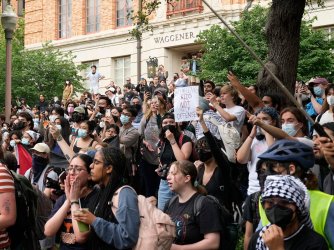Table of Contents
VICTORY: Fairmont State University revises unconstitutional solicitation policy

FAIRMONT, W.Va., April 21, 2017—In response to a letter from the Foundation for Individual Rights in Education, the Fairmont State University Board of Governors voted yesterday to revise the university’s Campus Solicitation Policy. FIRE called on Fairmont State to review the unconstitutional policy last October after a campus police officer cited it to warn a student that he needed permission to gather signatures for a student group on campus.
“Public universities cannot require students to get written permission to take part in political canvassing on campus,” said FIRE Program Officer Sarah McLaughlin. “FIRE commends Fairmont State for working with us to ensure its students are free to engage in core expressive activity.”
Last August, student Dustin Winski stood outside Fairmont State’s student center to collect signatures in support of the national campus libertarian group Young Americans for Liberty. After an hour, a campus police officer informed Winski that he needed a permit to continue to speak to students because “soliciting requires you to … ask permission to do it.” When Winski sought clarification from an administrator, he was told that Fairmont State’s decision to require a permit would rest on “a judgment call based on campus security and what they feel is soliciting.”
FIRE wrote to Fairmont State on Oct. 7 asking the university to revise its unconstitutional policy in order to protect students’ First Amendment rights. Fairmont State’s policy not only required that students get permission from administrators to engage in basic expressive activity, but also that they provide copies of any literature they intended to hand out for advance approval. FIRE also contested Fairmont State police officers’ ability to decide, on their own, what type of expressive activity constituted solicitation that would be subject to prior approval.
In response to FIRE’s letter, West Virginia Assistant Attorney General Dawn George reviewed the solicitation policy and worked with FIRE to revise its language, after which FIRE’s suggested policy revisions were sent to the university’s Board of Governors. At yesterday’s meeting, the Board of Governors voted to accept those revisions.
“Campuses risk losing their vibrancy when they place unconstitutional burdens on student expression,” said McLaughlin. “FIRE stands ready to work with any university interested in reforming its speech codes to better protect its students’ First Amendment rights.”
The Foundation for Individual Rights in Education is a nonpartisan, nonprofit student rights organization dedicated to defending liberty, freedom of speech, due process, academic freedom, legal equality, and freedom of conscience on America’s college campuses.
CONTACT:
Daniel Burnett, Communications Manager, FIRE: 215-717-3473; media@thefire.org
Recent Articles
FIRE’s award-winning Newsdesk covers the free speech news you need to stay informed.

Freedom or safety? College admins don’t need to choose.

Texas tramples First Amendment rights with police crackdown of pro-Palestinian protests

Kansas takes a stand for intellectual freedom
